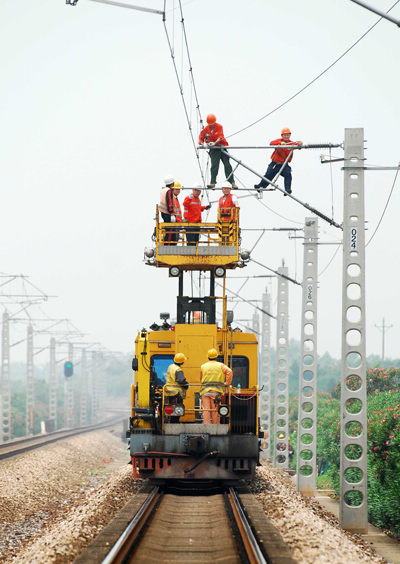|
 |
|
ADDED MEASURES: Workers accelerate electrification of the Beijing-Kowloon Railway. Analysts believe China may slow down railway investments in the wake of the latest bullet train accident (HU GUOLIN) |
While China mourns the lives lost in the high-speed rail crash on July 23 near Wenzhou, the accident's far-reaching implications for the economy are being increasingly felt.
One casualty of the disaster is likely to be the country's ambitious plan to press ahead with a building spree of high-speed railways—the crash may lead to a delay or scaling-down of these projects.
The Chinese Government has poured exorbitant sums into developing the world's largest high-speed rail system, which had reached 8,358 km of tracks by the end of last year. It is expected to exceed 13,000 km by 2012 and 16,000 km by 2020. The train collision was the first serious accident involving China's bullet trains, which began running in 2007.
China aimed for a small decline in railway infrastructure investment this year, setting the annual spending target at 745.5 billion yuan ($115.6 billion). But now many analysts believe China could miss that target, as it will have to slow down the pace of construction and focus on rail safety.
"Since 2008 China has experienced a significant leap forward in railway building," said Song Bin, a senior analyst with the Beijing-based Tianxiang Investment Consulting Ltd. "The speed of construction is set to slow down."
Whatever the cause of the crash, China will attach greater importance to making its bullet trains safer, said the Ping An Securities Co. Ltd. in a recent report.
"The government is bound to tighten its efforts to address problems in train dispatching and signaling systems and railway management," the report said.
Jiang Langting, an analyst with the Gao Hua Securities Co. Ltd., said the accident, along with other recent malfunctions in high-speed rails, can help push forward a new round of reforms within the Ministry of Railways (MOR).
"It is now imperative for the ministry to heighten its management efficiency and profitability," Jiang said.
Zhao Jian, a professor at the School of Economics and Management of the Beijing Jiaotong University, said this accident is the outcome of exponential development in high-speed railways.
"The MOR should rethink the development model of high-speed railways and balance speed and quality, as well as benefits and safety," he said.
Even before the crash, high-speed rails were the target of criticism due to possible environmental damage and ticket prices that are too high for ordinary Chinese consumers.
"After so many years of rapid expansion, China's high-speed railway investment needs to take a breath," said Zhen Yi, an analyst with the GF Securities Co. Ltd. in Shenzhen.
"However, it's very unlikely for the country to give up those lines already under construction, which involve trillions of yuan in total investment," she added.
As the Chinese economy moves out of the shadow of the financial crisis, robust investment deserves much of the credit. But economists believe the recent railway tragedy will promote policymakers to put the breaks on aggressive investment expansion, marking a turning point in the country's growth model.
"Authorities may choose intentionally to slow economic growth gradually but firmly to 7-8 percent in following years and spend more time fixing the problems caused by fast growth," said Minggao Shen, chief economist for Greater China, Citigroup Inc.
| 